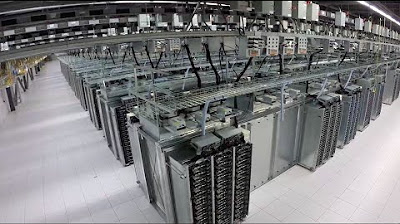What are the core principles behind Google data centers?
Summary
TLDRGoogle's data centers are designed with an unwavering focus on performance, availability, security, and sustainability. They employ custom-built components for superior performance, using commodity hardware as the foundation. Google Cloud servers incorporate the Google Titan chip for enhanced security throughout the server lifecycle. A fault-tolerant design ensures continuous operation, with constant monitoring and machine learning for proactive maintenance. The goal is to maintain a balance between performance and cost while safeguarding user data.
Takeaways
- 🏭 **Performance Focus**: Google data centers prioritize performance, with a customized design for every part of the stack to ensure ultra-high performance.
- 🌐 **Unified Global Network**: These data centers, hosting clusters of hundreds of thousands of servers, operate as a unified network across the globe.
- 🛠️ **Customization Over Off-the-Shelf**: Google does not rely on standard components; instead, they customize and build almost every part for optimized performance.
- 🌡️ **Innovative Cooling**: Cooling plants are also part of the customized design, contributing to the overall performance optimization.
- 💻 **Commodity Hardware Foundation**: Google's tech stack is built on commodity hardware, providing a cost-effective foundation for their operations.
- 🔧 **Lean Server Components**: Data center servers are stripped down to only necessary components, focusing on lean and high performance.
- 🔒 **Google Titan Security**: Google Cloud servers incorporate the Google Titan chip, which secures servers from manufacturing to end-of-life using Root of Trust technology.
- 🛑 **Fault-Tolerance**: Google employs a fault-tolerant design to ensure services remain operational 24/7, crucial for billions of users.
- 🔧 **Constant Infrastructure Monitoring**: Every hardware component and system is monitored constantly for various data points to maintain system integrity.
- 🤖 **Machine Learning for Diagnostics**: Machine learning and diagnostic tools are used to suggest corrective actions for machine failures.
- 🔄 **24/7 Operations**: Hardware operations teams perform deployments, maintenance, upgrades, and repairs around the clock to keep the infrastructure robust.
Q & A
What are the four core principles that Google focuses on for its data centers?
-The four core principles that Google focuses on for its data centers are performance, availability, security, and sustainability.
Why does Google customize the design and build of almost every part of the stack in its data centers?
-Google customizes the design and build of almost every part of the stack to achieve ultra-high performance tailored to its specific needs, rather than relying on off-the-shelf components.
How does Google approach the use of hardware in its data centers?
-Google builds from the bottom up, using commodity hardware as the foundation for its custom tech stack, which runs hundreds of thousands of jobs across machines for distributed performance and scale.
What is the role of the Google Titan chip in securing Google Cloud servers?
-The Google Titan chip helps secure every server through its entire lifecycle by using Root of Trust technology, which cryptographically ensures that the chip hasn't been tampered with and significantly reduces the chance of vulnerabilities.
How does Google ensure the continuous operation of its services for billions of users?
-Google uses a fault-tolerant design that is maintainable from concept to operations, which includes constant monitoring of every hardware component and system, and the use of machine learning and diagnostic tools for corrective actions.
What is the significance of the lean, high-performance components used in Google's data center servers?
-The lean, high-performance components used in Google's data center servers are optimized for performance and cost efficiency, providing a sweet spot when multiplied by the thousands, which is essential for large-scale operations.
How does Google's approach to data center operations differ from a typical desktop computer setup?
-Google's data center servers use only the components needed for lean, high performance, unlike a typical desktop computer which has technology optimized for general home use.
What kind of technology does Google use to monitor and maintain its infrastructure?
-Google uses machine learning and machine failure diagnostic tools to monitor and maintain its infrastructure, suggesting corrective actions and ensuring constant upgrades and reconfigurations.
How does Google ensure the security and protection of its data centers for users and Google Cloud customers?
-Google ensures the security and protection of its data centers through a combination of advanced hardware like the Google Titan chip, constant monitoring, and the operations of hardware teams that perform deployments, maintenance, upgrades, and repairs around the clock.
What is the purpose of the 'Discovering Data Centers' series mentioned in the script?
-The 'Discovering Data Centers' series aims to provide more insights into the operations, security measures, and technological innovations within Google's data centers.
How does Google's data center infrastructure support the sustainability principle?
-Although not explicitly mentioned in the script, Google's focus on sustainability in its data centers likely involves energy-efficient designs, renewable energy sources, and waste reduction strategies to minimize environmental impact.
Outlines

Esta sección está disponible solo para usuarios con suscripción. Por favor, mejora tu plan para acceder a esta parte.
Mejorar ahoraMindmap

Esta sección está disponible solo para usuarios con suscripción. Por favor, mejora tu plan para acceder a esta parte.
Mejorar ahoraKeywords

Esta sección está disponible solo para usuarios con suscripción. Por favor, mejora tu plan para acceder a esta parte.
Mejorar ahoraHighlights

Esta sección está disponible solo para usuarios con suscripción. Por favor, mejora tu plan para acceder a esta parte.
Mejorar ahoraTranscripts

Esta sección está disponible solo para usuarios con suscripción. Por favor, mejora tu plan para acceder a esta parte.
Mejorar ahoraVer Más Videos Relacionados

Google Data Center Efficiency Best Practices Full Video

GOOGLE DATA-CENTER के अंदर क्या होता है? | What Happens Inside a Google Data Center

Cloud vs. traditional architecture

GOOGLE DOCUMENTARY | Managing Organizational Behavior

Inside a Google data center

Benefits of High Availability and Scalability in the Cloud - AZ-900 Certification Course
5.0 / 5 (0 votes)
